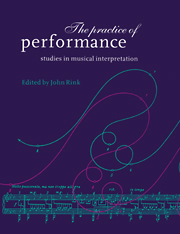Book contents
- Frontmatter
- Contents
- Preface
- PART ONE FUNDAMENTALS
- 1 What do we perform?
- 2 Expression in performance: generativity, perception and semiosis
- 3 Musical motion and performance: theoretical and empirical perspectives
- 4 Deliberate practice and elite musical performance
- PART TWO STRUCTURE AND MEANING IN PERFORMANCE
- PART THREE PERFORMANCE AS PROCESS
- Index
1 - What do we perform?
Published online by Cambridge University Press: 10 October 2009
- Frontmatter
- Contents
- Preface
- PART ONE FUNDAMENTALS
- 1 What do we perform?
- 2 Expression in performance: generativity, perception and semiosis
- 3 Musical motion and performance: theoretical and empirical perspectives
- 4 Deliberate practice and elite musical performance
- PART TWO STRUCTURE AND MEANING IN PERFORMANCE
- PART THREE PERFORMANCE AS PROCESS
- Index
Summary
What is the ‘music’ that we play or study? Other languages are more explicit than English, with words like partition and Musiknoten, in defining that musical scores are not music per se. The relationship between notation and music is well illustrated by Stravinsky's claim that he could play the ‘Danse sacrale’ from the Rite of Spring for some time before he was able to write it down (Stravinsky and Craft 1962: 141). Although this distinction may seem hairsplitting to performers, we can hear all around us the results of regarding music as the symbols on the page, which one must then ‘make interesting’. ‘Put some expression into it!’ is still a ubiquitous cry even at conservatories, notwithstanding the contradiction in terms.
Ravel's request that pianists should ‘just play’ rather than ‘interpret my music’ (Long [1960] 1972: 21) focuses the question for performers: can we actually ‘interpret music’? Surely not, except by distorting it. What we can interpret – indeed, can only interpret – is its notation. Since notation, to quote the ever-literal French, ‘partitions’ music (that is, represents or encodes it in a welter of mostly binary symbols, involving variable conventions and shorthands), it cannot avoid distorting it, and our task is to ‘read back through’ the distortions on paper, employing aural and visual awareness, skill and sensitivity.
Although scores are the most fixed point of reference for our classical repertoire, far from being absolutes they rest on sand, and what we scientifically trust least, our musical feeling, remains the strongest and final link to what the composer sensed and heard before subjecting it to notation.
- Type
- Chapter
- Information
- The Practice of PerformanceStudies in Musical Interpretation, pp. 3 - 20Publisher: Cambridge University PressPrint publication year: 1995
- 6
- Cited by



